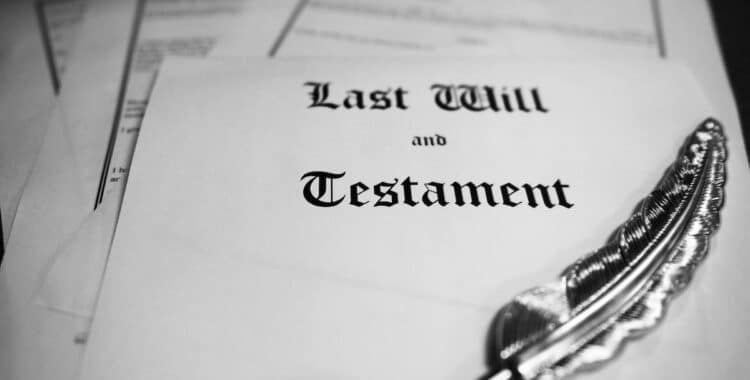Dying Without a Will in Alberta: What Happens to my Assets?
Having a valid, up-to-date Will in place is extremely important. However, the stark reality is that most Canadians don’t have one. In fact, a 2018 Angus-Reid poll cited in the National Post found that only 35% of Canadians have an up-to-date Will in place, and only 51% of Canadians have a Will at all!
The numbers beg the question: what happens to the assets of the 49% of Canadians who will pass away leaving no Will at all?
The short answer is “it depends”. There are many misconceptions about what happens to the assets of someone who passes away without leaving a Will, ranging from half-truths to full-on urban legends. We’ll address some of those misconceptions, but the primary focus of this article will be the current Alberta legislation governing the distribution of a deceased’s assets when they pass away without leaving a Will.
Does Everything Really go to the Government?
As a Wills & Estates lawyer, one of the most common statements I hear from people is “I need a Will because I don’t want my assets to go to the government.” It’s a common and valid concern that is no doubt well-intentioned, but there are other, far more important reasons to get a Will than this one.
I need a Will because I don’t want my assets to go to the government.
While there are rare situations where the government becomes entitled to a deceased’s assets, those situations are the exception rather than the norm. There aren’t formal statistics to track it, but in my experience as a Wills & Estates lawyer, more than 99% of estates go to someone other than the government, even when the deceased fails to leave a Will.
So Where do the Assets Go?
The Wills and Succession Act determines what happens to your assets if you die in Alberta without leaving a Will. The formal legal term for an individual who dies without leaving a Will is ‘intestate’. Similarly, the Estate of someone who died without a Will is called an ‘intestate Estate’. Part 3 of the Act details how such intestate Estates are to be distributed.
According to the legislation, here’s what happens to an intestate Estate:
If you pass away leaving no children but have a spouse/AIP:
- Your surviving (living) spouse or adult interdependent partner (AIP) gets your entire estate. An adult interdependent partner includes a common-law spouse, but the term also extends to anyone with whom you have lived in a relationship of interdependence for a minimum of three (3) years.
- If you die leaving a surviving spouse and a surviving AIP, each individual is, in many circumstances, entitled to half of your Estate. This is not as uncommon a situation as it may seem. People often separate from a spouse without formalizing their divorce and then move in with another partner later down the road. That said, the separated spouse is only entitled to a 50% share of the Estate in certain circumstances. If you’re dealing with this type of situation, it’s important to consult with an experienced Wills & Estates lawyer to determine whether a separated spouse would have any entitlement to the Estate in question.
If you pass away leaving no children, spouse, or AIP:
- The Estate is distributed to the deceased’s parents in equal shares, or, if one parent has passed away, to the surviving parent entirely.
- If the deceased’s parents are also deceased, the Estate goes to the descendants of either parent in equal shares, in other words, to any brothers, sisters, half-sisters, or half-brothers of the deceased.
- If someone dies leaving no children, spouse, AIP, parents, or siblings, the legislation sets out several more layers of distribution priority. If you are the Executor of such an Estate, the Wills & Estates team at West Legal can assist you in determining who is entitled to the Estate assets.
If you pass away leaving children and a spouse/AIP:
- If someone dies leaving children and a spouse or AIP, and all of the deceased’s children are also children of the spouse or AIP, the surviving spouse or AIP is entitled to the entire Estate.
- If any of the deceased’s children are not also children of the deceased’s surviving spouse or AIP, the surviving spouse or AIP is only entitled to the greater of the following:
- 50% of the net value of the Estate; or
- The legislatively prescribed amount, which, in Alberta, is currently $150,000.00.
The remaining Estate is divided among the deceased’s descendants in accordance with the other provisions of Part 3 of the Act.
If you pass away leaving children, but no spouse/AIP:
- When someone dies leaving children or descendants, but no spouse/AIP, the Estate is divided into as many shares as there are surviving children and deceased children who left children/descendants of their own.
- Things can get more complicated, but here’s a simple example for illustrative purposes:
- One Share for Child A (Alive)
- One Share for Child B (Deceased, but left children)
The shares would then be distributed as follows:
- Child A receives his or her full share; and
- The children of Child B receive Child B’s share in equal shares.
What If I’m In a Unique Situation?
While this article covers some of the most common circumstances facing intestate estates, the lawyers at West Legal recognize that every situation is unique and that a one-size-fits-all approach isn’t usually effective when it comes to Estate law.
If we haven’t addressed your particular situation above, we recommend that you reach out to the Wills & Estates team at West Legal. Our lawyers are able to provide you with a clear answer as to how the assets of an intestate estate are to be distributed, regardless of the circumstances.
Even if the particulars of the Estate you’re dealing with, or may be entitled to, match one of the scenarios described above, it’s essential that you consult with an Estates lawyer as it’s impossible to capture every aspect of the legislation in one article.
We’re Happy to Help!
If you’re an Executor seeking legal advice regarding the distribution of an intestate Estate, or if you’re a family member or potential beneficiary of a deceased and looking for legal advice concerning your rights and responsibilities, the experienced Wills and Estates lawyers at West Legal are currently booking face-to-face and telephone consultations and would be happy to advise you.

